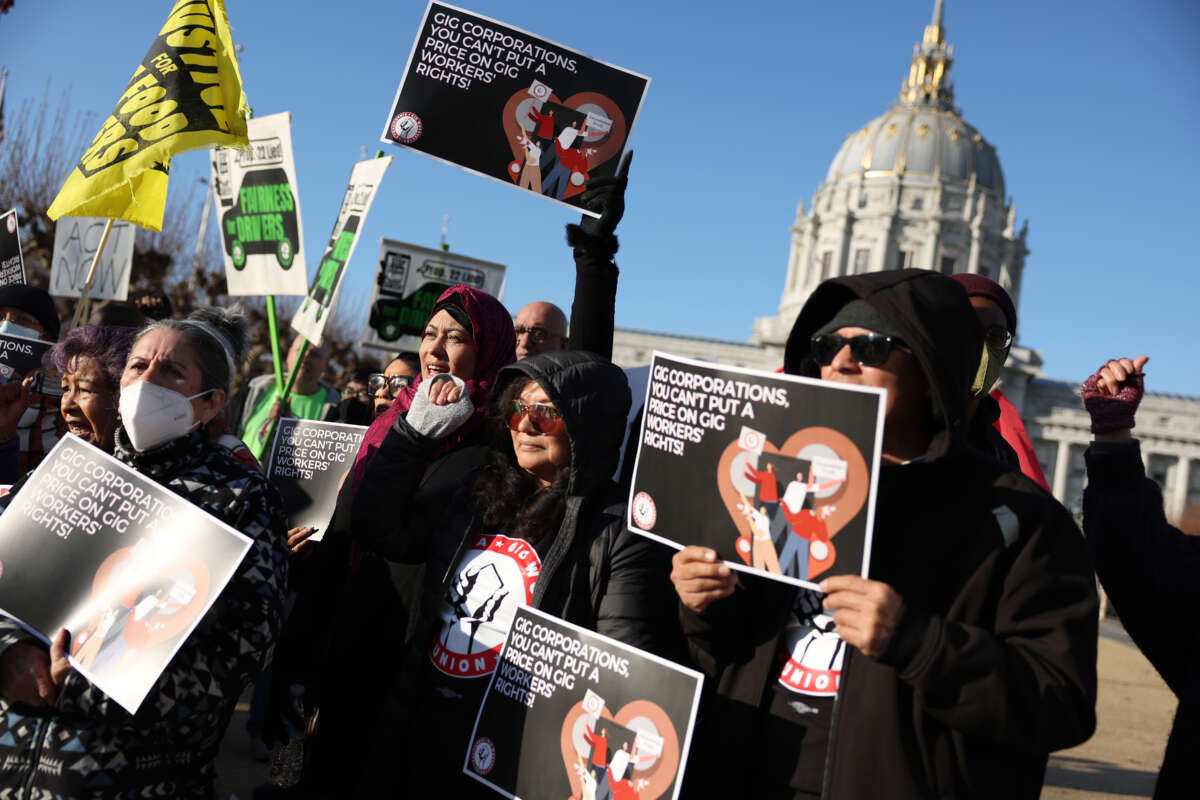On Monday, California’s First District Court of Appeals ruled that a 2020 ballot initiative classifying drivers for gig companies as independent contractors rather than employees was largely constitutional.
The ballot initiative, Proposition 22, passed with 59% of the vote and has been critiqued by the Service Employees International Union (SEIU) as having been financed and lobbied for by gig companies like Uber, Lyft and DoorDash.
Nearly 1.4 million Californians are part of the gig economy, providing on-demand work or services like Uber rides or food deliveries. Polling from the Pew Research Center finds that 16 percent of Americans have worked in the gig economy and that 69 percent of gig workers are Black, Hispanic or Asian. Thirty five percent of gig workers have reported feeling unsafe while working and 19 percent say they have experienced sexual harassment on the job.
Labor advocates say that the gig economy is exploitative, and that the differentiation between independent contractors and employees is critical. If an individual is an employee, then the company they work for is required to offer them specific benefits and labor protections, such as minimum wage, sick leave and family leave, unemployment, and disability benefits.
While the federal government sets the minimum standards for employment protection, California is considered one of the most employee-friendly states in the country and requires that employers provide additional benefits and protections for workers, such as rest and meal breaks, minimum wage and overtime, benefits if workers are injured on the job, health and safety protections, and whistleblower protections.
Independent contractors, on the other hand, are not granted these protections and benefits. As journalist Robert R. Raymond explained in a 2021 article for Truthout, “The passage of Proposition 22 means that roughly 8.5 percent of the workforce in California will not be guaranteed a minimum wage, won’t have access to unemployment insurance or overtime pay, will not get paid sick leave or family leave, and will have no protection from discrimination based on immigration status or historical traits tied to race.”
Prop 22 was supported by the Republican Party of California, corporations including DoorDash, Instacart, Lyft, Postmates, and Uber, and multiple police unions. Gig economy companies spent more than $224 million in lobbying costs to get voters to pass the ballot measure, making the proposition the most expensive ballot initiative campaign in the state’s history.
“Prop 22 is great for employers, but it’s a huge loss for workers,” former U.S. Secretary of Labor Robert Reich said in 2020. “This will encourage other companies to reclassify their work force as independent contractors, and once they do, over a century of labor protections vanishes overnight.”
Prop 22 was developed by gig corporations in response to the California’s legislature’s passage of Assembly Bill 5 in 2019, which gig companies were intensely opposed to. AB5 reclassified millions of workers in the state as employees under the “ABC” test. The Economic Policy Institute found that AB5 would protect workers from being misclassified as independent contractors and would specifically safeguard gig economy workers.
“Although Uber and Lyft ride-hail drivers and DoorDash, Instacart, and Postmates food-delivery workers are clearly employees under the AB5 test, these companies steadfastly refused to comply with the law and continued to deny their workers the rights and benefits to which they are entitled as employees,” the National Employment Law Project said in a statement.
Shortly after Prop 22 passed, several drivers and SEIU sued the state of California, arguing that the proposition was unconstitutional. Protect App-Based Drivers and Services Coalition, a group backing Prop 22 made up of Uber, Lyft, DoorDash and Instacart, joined the lawsuit as an intervenor, or a nonparty to the suit with interests in the lawsuit’s outcome.
In 2021, the Superior Court of California ruled that Prop 22 was unconstitutional and, therefore, unenforceable. This opinion was appealed to California’s First District Court of Appeals, which reversed most of the lower court’s decision that had overturned Prop 22.
The SEIU is considering appealing the decision to California’s Supreme Court.
“Drivers have always led this movement, and we will follow their lead as we consider all options — including seeking review from the (California) Supreme Court — to ensure that gig drivers and delivery workers have access to the same rights and protections afforded to other workers in California,” the union said in a statement.
Join us in defending the truth before it’s too late
The future of independent journalism is uncertain, and the consequences of losing it are too grave to ignore. To ensure Truthout remains safe, strong, and free, we need to raise $43,000 in the next 6 days. Every dollar raised goes directly toward the costs of producing news you can trust.
Please give what you can — because by supporting us with a tax-deductible donation, you’re not just preserving a source of news, you’re helping to safeguard what’s left of our democracy.
